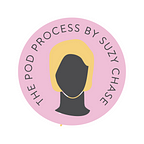The Podcast Tip No One Talks About
When podcasting came on the scene in 2005 it represented a shift from broadcast radio to on–demand personalized audio. While many features from broadcast radio shifted over to podcasting, I’ve noticed one major element of broadcast radio has been left out of the podcasting conversation.
Your voice.
For nearly a decade I hosted a major market evening love songs, request and dedication radio show. Each month I had an aircheck session with my program director. An aircheck is a taped series of your audio segments edited tightly together. I’m telling you, there was nothing more nerve-racking than sitting in my boss’ office while he listened to my aircheck, volume cranked up. He would pause the tape periodically to critique my performance, often times commenting on my vocal delivery.
In podcasting, your content isn’t the only thing people hear. They’re also tuned in to your voice; the sound, the quality, the inflection.
Here are four voice tips:
1) At most of the big radio stations the jocks stand up. Posture affects your voice and your energy. Make sure your back is straight while you are speaking.
2) There’s no point of having a great sounding voice without clarity. Enunciation is the key.
3) Sound like a success. “Vocal fry”, a low creaky vibration at the end of a phrase or sentence (think Kim Kardashian), and “upspeak”, when your voice goes up at the end of a sentence like you’re asking a question, take away from your authority.
4) A relaxed voice sounds better. Slow down, breathe and don’t be afraid to pause.
The gold standard for a broadcast voice used to be something called Announcer-Speak which grew out of the Mid-Atlantic Accent. It was a blend of American and British English that was considered to have an authoritative quality. When I coach podcasters I tell them “you be you.” You don’t have to have a Mid-Atlantic, NPR, or BBC affect.
An old radio adage says “It takes years to build an audience, and only a few seconds to drive them away.” Use your unique voice to build your audience. It’s just as important as content.
